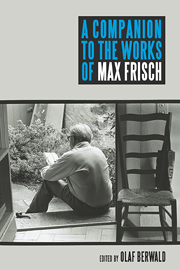Book contents
- Frontmatter
- Contents
- Acknowledgments
- Note on the Abbreviations
- Introduction: Max Frisch in the Twenty-First Century
- 1 Max Frisch's Early Plays
- 2 Spielraum in Max Frisch's Graf Öderland and Don Juan: Transparency as Mode of Performance
- 3 Max Frisch's Biedermann und die Brandstifter and Die große Wut des Philipp Hotz
- 4 Max Frisch's Andorra: Balancing Act between Pattern and Particular
- 5 Eternal Recurrence in Life and Death in Max Frisch's Late Plays
- 6 Max Frisch's Early Fiction
- 7 From Life to Literature: Max Frisch's Tagebücher
- 8 “Writing in order to be a stranger to oneself”: Max Frisch's Stiller
- 9 Cybernetic Flow, Analogy, and Probability in Max Frisch's Homo Faber
- 10 The Ends of Blindness in Max Frisch's Mein Name sei Gantenbein
- 11 Max Frisch's Montauk. Eine Erzählung
- 12 Man, Culture, and Nature in Max Frisch's Der Mensch erscheint im Holozän
- 13 “My life as a man. Everyman”: Max Frisch's Blaubart. Erzählung
- 14 Max Frisch's Essays and Speeches
- Frisch's Major Works
- Select Bibliography
- Notes on the Contributors
- Index
Introduction: Max Frisch in the Twenty-First Century
Published online by Cambridge University Press: 05 December 2013
- Frontmatter
- Contents
- Acknowledgments
- Note on the Abbreviations
- Introduction: Max Frisch in the Twenty-First Century
- 1 Max Frisch's Early Plays
- 2 Spielraum in Max Frisch's Graf Öderland and Don Juan: Transparency as Mode of Performance
- 3 Max Frisch's Biedermann und die Brandstifter and Die große Wut des Philipp Hotz
- 4 Max Frisch's Andorra: Balancing Act between Pattern and Particular
- 5 Eternal Recurrence in Life and Death in Max Frisch's Late Plays
- 6 Max Frisch's Early Fiction
- 7 From Life to Literature: Max Frisch's Tagebücher
- 8 “Writing in order to be a stranger to oneself”: Max Frisch's Stiller
- 9 Cybernetic Flow, Analogy, and Probability in Max Frisch's Homo Faber
- 10 The Ends of Blindness in Max Frisch's Mein Name sei Gantenbein
- 11 Max Frisch's Montauk. Eine Erzählung
- 12 Man, Culture, and Nature in Max Frisch's Der Mensch erscheint im Holozän
- 13 “My life as a man. Everyman”: Max Frisch's Blaubart. Erzählung
- 14 Max Frisch's Essays and Speeches
- Frisch's Major Works
- Select Bibliography
- Notes on the Contributors
- Index
Summary
Why should we read Max Frisch (1911–91) in the twenty-first century? Because his works relentlessly examine an acutely crippling human condition, our addiction to turning ourselves and others into passive recipients of fixed images and projections. But beyond the undiminished relevance of this main thematic thread that runs through all of Frisch's works, his sparse and precise prose style generates a rare level of aesthetic and intellectual pleasure that reintroduces his readers to the intense joy of thinking through what it could mean to be human. The introspective playfulness of this classic writer of late modernism seduces readers to immerse themselves in Socratic skepticism. Frisch's sketch-books, fictional prose, plays, essays, and speeches offer the reader useful and stimulating antidotes against complacent catchwords and prescriptive solutions that mask the personal crises and social conflicts of today's over-medicated societies. Frisch challenges us to think through who we are by inviting us to imagine who else we might have been.
Nobody has outlined the resilience of curiosity that is at the core of our assessment of Frisch more lucidly than Stefan Zweig. In a letter to his fellow exiled writer Hermann Kesten composed in Petropolis, Brazil, on January 15, 1942, Zweig explains his interest in the French philosopher Montaigne in a way that may also serve as an elucidation of Frisch's continuing relevance to readers in the twenty-first century.
- Type
- Chapter
- Information
- A Companion to the Works of Max Frisch , pp. 1 - 9Publisher: Boydell & BrewerPrint publication year: 2013

